人教新目标中考英语复习-- 代词(共有PPT102张)
文档属性
| 名称 | 人教新目标中考英语复习-- 代词(共有PPT102张) | 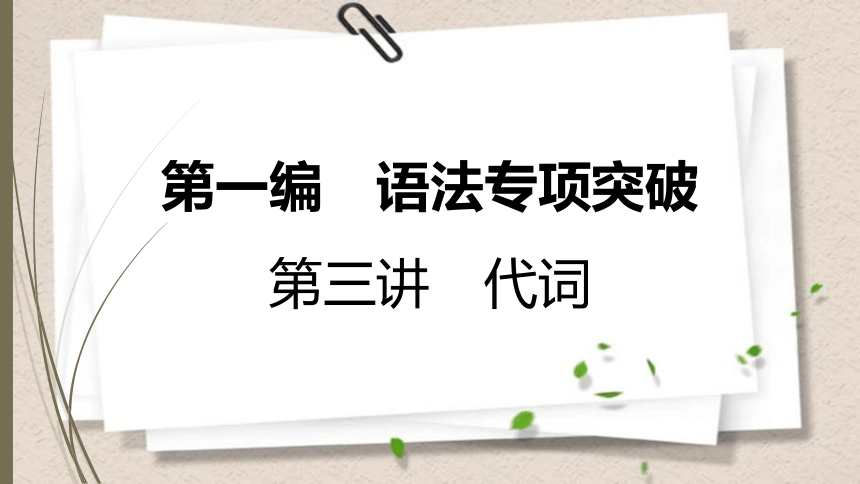 | |
| 格式 | pptx | ||
| 文件大小 | 4.0MB | ||
| 资源类型 | 教案 | ||
| 版本资源 | 通用版 | ||
| 科目 | 英语 | ||
| 更新时间 | 2022-02-12 15:46:35 | ||
图片预览

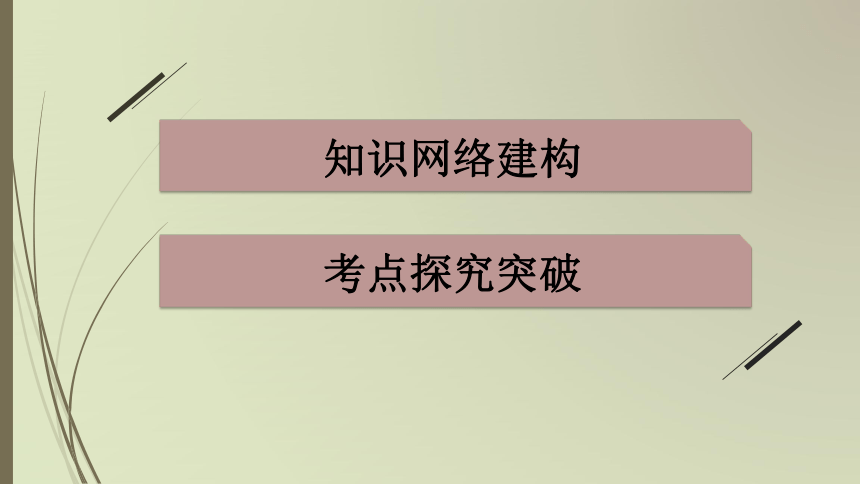

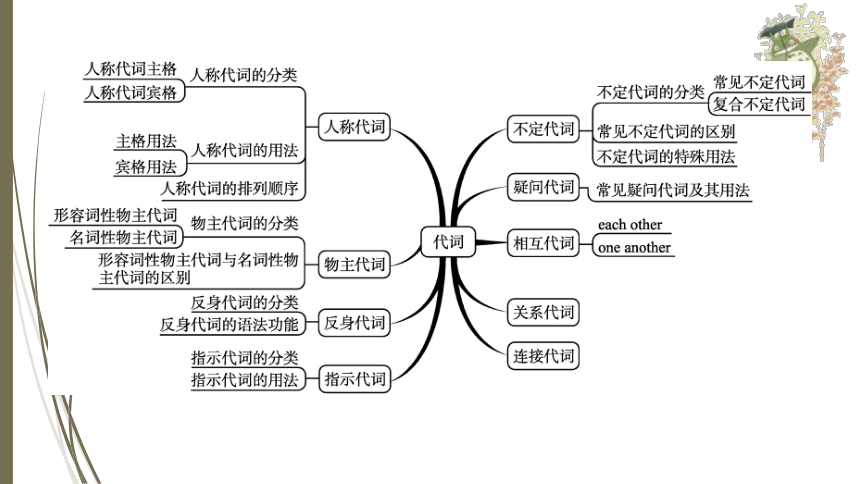
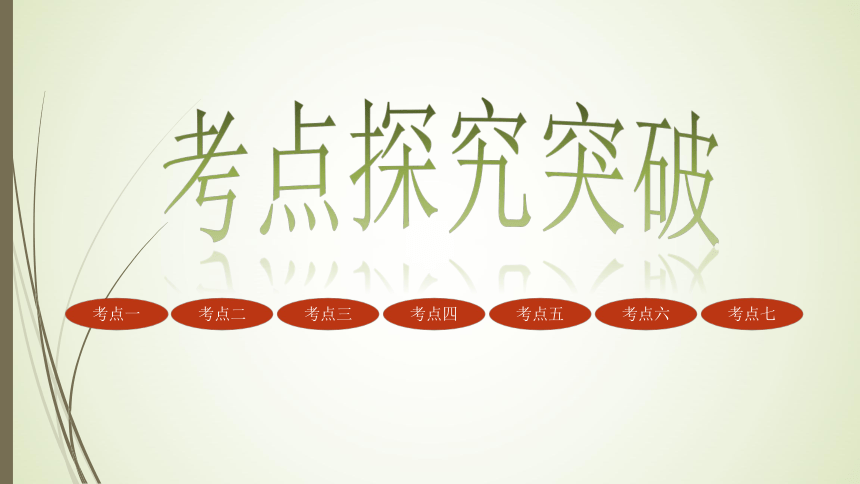
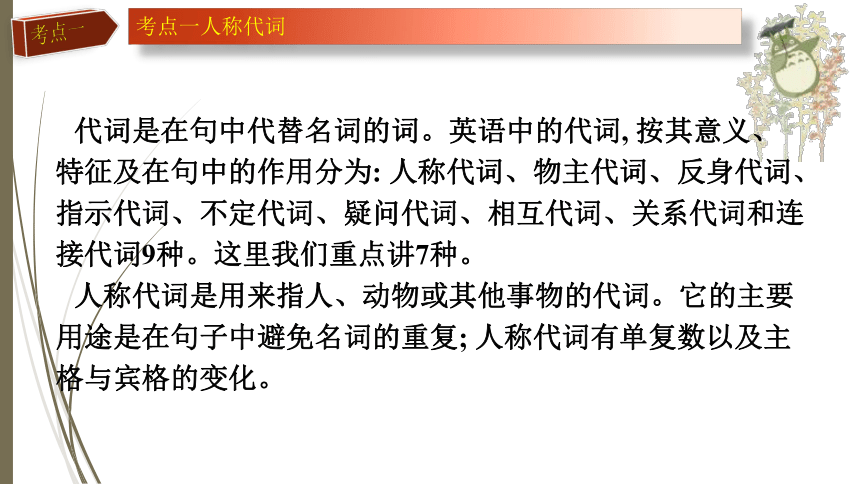
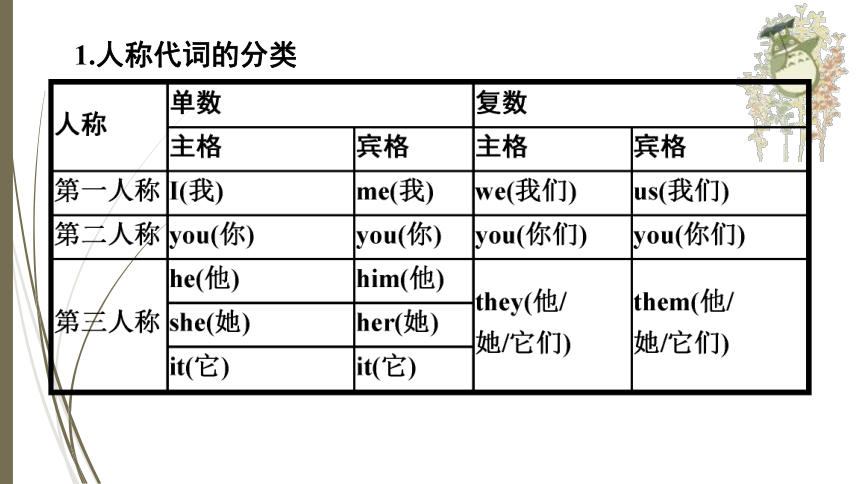
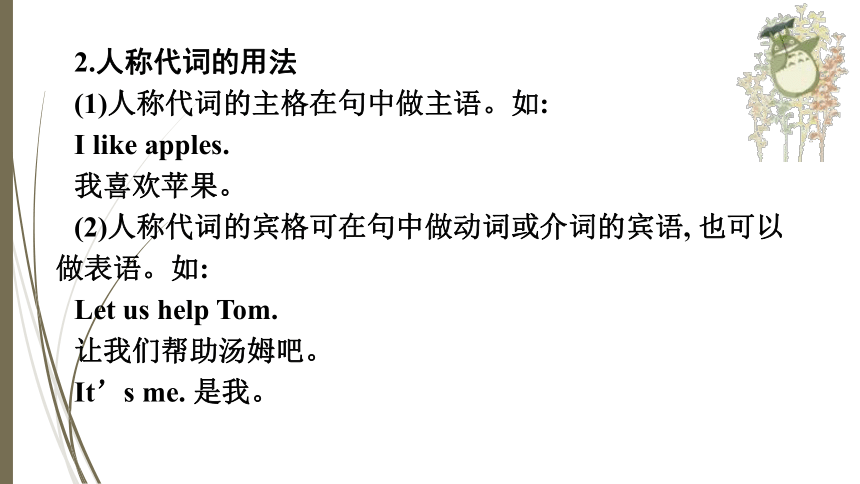
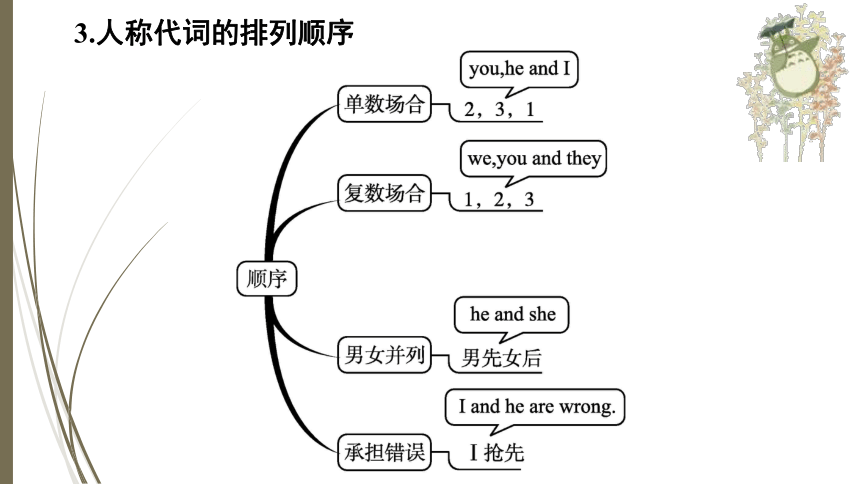
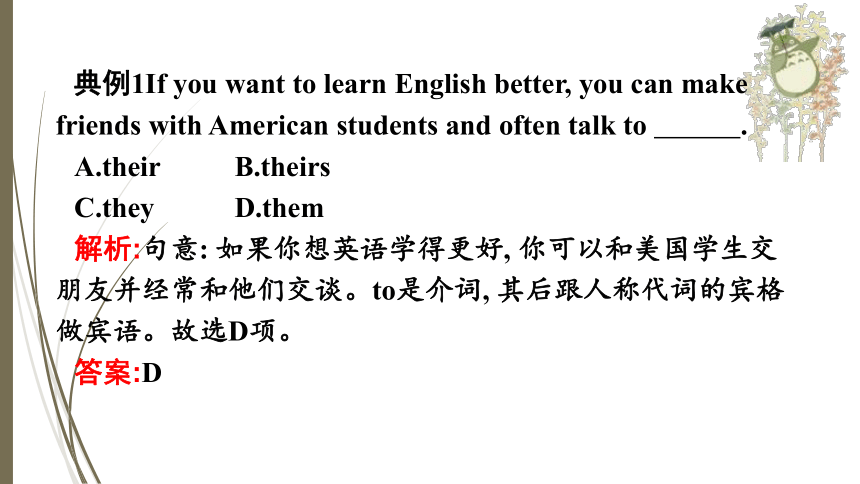
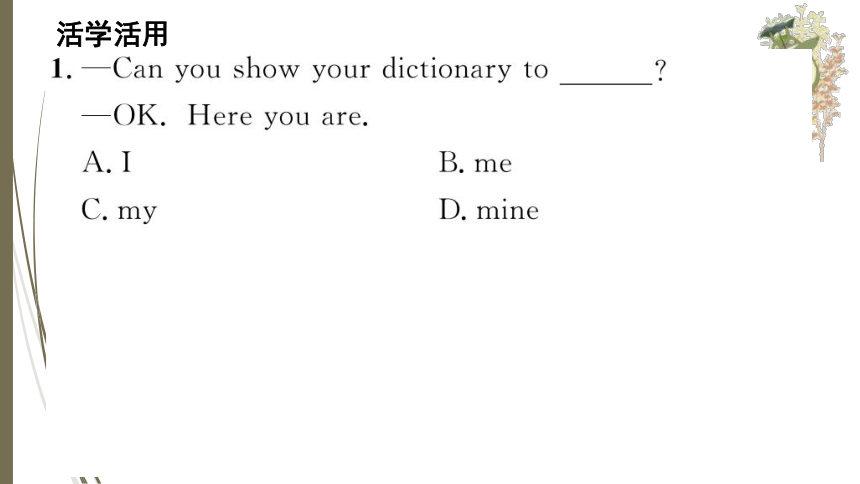

文档简介
(共102张PPT)
第一编 语法专项突破
第三讲 代词
知识网络建构
考点探究突破
知识网络建构
考点一
考点二
考点三
考点四
考点五
考点六
考点探究突破
考点七
考点一
考点一人称代词
代词是在句中代替名词的词。英语中的代词, 按其意义、特征及在句中的作用分为: 人称代词、物主代词、反身代词、指示代词、不定代词、疑问代词、相互代词、关系代词和连接代词9种。这里我们重点讲7种。
人称代词是用来指人、动物或其他事物的代词。它的主要用途是在句子中避免名词的重复; 人称代词有单复数以及主格与宾格的变化。
1.人称代词的分类
2.人称代词的用法
(1)人称代词的主格在句中做主语。如:
I like apples.
我喜欢苹果。
(2)人称代词的宾格可在句中做动词或介词的宾语, 也可以做表语。如:
Let us help Tom.
让我们帮助汤姆吧。
It’s me. 是我。
3.人称代词的排列顺序
典例1If you want to learn English better, you can make friends with American students and often talk to .
A.their B.theirs
C.they D.them
解析:句意: 如果你想英语学得更好, 你可以和美国学生交朋友并经常和他们交谈。to是介词, 其后跟人称代词的宾格做宾语。故选D项。
答案:D
活学活用
3.Reading more helps learn better.
A.we B.our
C.us D.ours
答案:C
解析:句意: 多读书能使我们学得更好。help是及物动词, 其后应该用人称代词的宾格us做help的宾语。
4.This morning Diana invited to birthday party.
A.I; her B.I; hers
C.me; her D.me; hers
答案:C
解析:句意: 今天早上戴安娜邀请我参加她的生日晚会。本句中 invite 是及物动词, 其后要接宾语, 第一个空要用人称代词宾格; 第二空后有名词birthday party, 需用形容词性物主代词修饰。故选C项。
考点二
物主代词
物主代词是表示所属关系的代词, 代指事物的主人。分为形容词性物主代词和名词性物主代词。
1.物主代词的分类
2.形容词性物主代词和名词性物主代词的区别
典例2These aren’t books. Mary, you left at home.
A.you; your
B.your; yours
C.yours; your
D.your; you
解析:由books可知第一设空处用形容词性物主代词, 由第二设空后不跟名词, 可知用名词性物主代词。故选B项。
答案:B
活学活用
考点三
反身代词
1.反身代词的分类
反身代词指动作的承受者是动作执行者本身的代词, 也就是表示“我自己, 你自己, 我们自己” 等的代词。单数以-self结尾, 复数以-selves结尾。具体如下:
2.反身代词的语法功能
I teach myself English.
我自学英语。
I don’t feel myself today.
我今天感觉不舒服。
You can do it by yourself.
你能自己做。
注意使用反身代词的时候, 反身代词和它所指的相应的对象在人称、性别和数上必须保持一致。
典例3If we just think about , the boat of friendship will be overturned anytime.
A.myself B.himself
C.yourself D.ourselves
解析:we的反身代词为ourselves。
答案:D
活学活用
12.The man called his professor for help because he couldn’t solve the problem by .
A.herself
B.himself
C.yourself
D.Themselves
答案:B
解析:by oneself意为“靠某人自己”, 本句的主语the man为男士, 用反身代词himself“他自己”, 故选B项。
考点四
指示代词
1.指示代词的分类
指示代词是用来指示或标识人或事物的代词。指示代词在句中可以做主语、表语和宾语。常用的指示代词有this/these, that/those。
2.指示代词的用法
典例4—The population of China is larger than of India.
—Yes, but India’s population is increasing rapidly.
A.it B.one
C.that D.this
解析:that可代指上文提到的不可数名词population。故选C项。
答案:C
活学活用
15.—Who’s
— is Tom speaking.
A.this; This
B.that; That
C.that; This
D.this; That
答案:C
解析:句意: ——你是谁 ——我是汤姆。打电话时称对方用that, 称呼自己用this。
16.The students in Class One are quieter than in Class Two.
A.that B.those
C.them D.ones
答案:B
解析:句意: 一班的学生比二班的学生更安静。比较级后面要用代词时, 一般用that或those, 根据句子可知前面是复数, 故用those在此代指上文提到的可数名词复数the students。
考点五
不定代词
1.不定代词的分类
不明确指代某个(些)人、某个(些)事物的代词叫作不定代词。
(1)兼作代词和限定词的不定代词
典例5Helen has got two brothers. of them likes chocolate, but she loves it.
A.Neither B.None
C.Each D.Any
解析:表示“两者都不” 用neither。故选A项。
答案:A
18.—Would you like tea or coffee
— , thanks! I prefer Coke.
A.Both B.Neither
C.All D.Some
答案:B
解析:由“谢谢! 我更喜欢可乐。” 可知我不喜欢上文中提到的茶和咖啡。neither“两者都不”。故选B项。
19.Neither Mike nor his cousins to Australia, but of them have known the country very well.
A.have been; all B.have gone; both
C.has been; all D.has gone; both
答案:A
解析:句意: 迈克和他的表兄弟们都没有到过澳大利亚, 但他们都很了解这个国家。neither... nor... “既不……也不……” 引导并列主语时, 谓语动词数的形式要与nor后面的主语一致, his cousins是复数, 所以排除选项C和D; both指两者, 迈克和他的表兄弟们, 不只是两人, 所以用all, 故选A项。
20.I don’t like this hat. Could you show me one
A.other B.another
C.others D.the other
答案:B
解析:another“另一个”; 由句意“我不喜欢这顶帽子” 可推测下文句意为“你能再给我看一下另一顶帽子吗 ” 故选B项。
(2)复合不定代词
①some-类复合不定代词多用于肯定句中, 也可用于表示邀请、请求或建议的疑问句中; any-类复合不定代词多用于否定句、疑问句和条件句中, 也可用于肯定句中, 意为“任何人” 或“任何事”。如:
I have something important to tell you.
我有重要的事情告诉你。
Would you like something to drink
你想喝点什么吗
I can’t see anything in the dark room.
在这个黑暗的房间里我什么也看不见。
Anything is possible. 一切皆有可能。
②复合不定代词被形容词所修饰时, 形容词要放在不定代词的后面。如:
Is there anything important in today’s newspaper
今天的报纸上有什么重要消息吗
典例6—Is there else in the classroom
—It is empty. is listening to a speech in the school hall.
A.anyone; Anyone
B.anyone; Everyone
C.everyone; Anyone
D.everyone; Everyone
解析:在疑问句中用anyone; everyone表示“每一个人”, 强调整体。故选B项。
答案:B
活学活用
2.常见不定代词的区别
(1)some和any
I have some questions to ask you.
我有些问题要问你。
Have you got any books
你有书吗
Would you like some coffee
你想要点咖啡吗
You can ask me any question.
你可以问我任何问题。
典例7—I have two soccer balls. What about you
—Oh, I don’t have .
A.some B.no
C.any D.much
解析:在否定句中用any。
答案:C
活学活用
28.—Have you got water to drink
—Here you are. There is still in the bottle.
A.some; any B.some; some
C.any; some D.any; any
答案:B
解析:some常用于肯定句中, 用于疑问句中时表示希望得到对方肯定的回答。故选B项。
(2)few, a few和little, a little
The problem is too difficult, and few students can work it out.
这道题太难了, 没几个学生能做出来。
She says little but does much.
她说得少, 做得多。
典例8This passage is very difficult. people can understand it.
A.A few B.Few
C.A little D.Little
解析:句意: 这段文章很难。没有几个人能够明白它。few“不多”, 本身含有否定意义。故选B项。
答案:B
活学活用
32.The fishermen knew about the island when they arrived there first.
A.few B.a little
C.a few D.little
答案:D
解析:由下文句意“他们首次到达时” 可推测上文句意为“渔民们对这个岛屿了解很少”。few和little表示否定意义, 但few修饰可数名词复数。故选D项。
(3)each, either, both, all, neither和none
典例9Old Mr. Black lives happily with his three dogs. of them are part of his family.
A.Both B.All
C.None D.Neither
解析:句意: 老布莱克先生和他的三只狗快乐地生活在一起。它们都是他家庭的一部分。all“三者或三者以上都”, 故选B项。
答案:B
活学活用
34.—Would you like some juice or milk
— is OK. I don’t mind.
A.Either B.Neither
C.Both D.All
答案:A
解析:句意: ——你要果汁还是牛奶 ——哪一个都行。我不介意。可知应该选either“两者之一”。
35.—Do you live by yourself, Mr. Wang
—Yes. I have two children. But of them lives with me. They are now studying in England.
A.both B.none C.neither D.either
答案:C
解析:句意: ——王先生, 你独自一人生活吗 ——是的。我有两个孩子。但是他们都不和我生活在一起。他们现在在英国学习。根据“I have two children.” 可以确定范围为两者, 因此可以排除B项, 再根据连词but和谓语动词为第三人称单数, 可判断本句主语表示单数意义, 因此可以排除A项。neither“两者都不” 符合句意。
36.There are many trees and flowers on side of Jingshi East Road.
A.both B.all
C.each D.every
答案:C
解析:each指“两者或两者以上中的每一个”; both“两者都”; every 指“三者或三者以上中的每一个”; all“都, 全部”。由路有两边以及side用的是单数形式可知用each修饰side。
(4)the other, the others, others和another
You can ask other people.
你可以问问别人。
We should help others.
我们应该帮助别人。
He has finished five bowls of porridge and he wants to drink another one.
他已经喝了五碗粥, 还想再喝一碗。
典例10(2020湖南长沙)The school offers two courses on computer technology. One is for beginners and is for those who already have some basic knowledge.
A.other B.another C.the other
解析:the other“两个中的另一个”。故选C项。
答案:C
活学活用
I have a new pen. My father bought it for me. And he bought one for my brother, too.
我有一支新钢笔, 是爸爸买给我的(这支钢笔)。而且他也给我弟弟买了一支(相似的但非上文那支)。
(5)one和it
典例11I can’t find my ticket. I think I have lost .
A.it B.one
C.this D.them
解析:it代指上文中提到的单个事物本身; one代指同类事物中的一个。故选A项。
答案:A
活学活用
44.I’ve bought many books on Chinese food. You can borrow if you like.
A.either B.one
C.it D.every
答案:B
解析:由句意可知“如果你喜欢, 你可以借一本书”, it指前面提到的单数名词; one指代前面提到的同类事物中的一个。故选B项。
规律总结it的其他用法
①指代婴儿或不明身份的人
②表示天气、时间、季节或距离
③答语中代替this/that
④形式主语常见句式:
A.It’s+adj.+(for/of sb.)to do sth.
B.It’s time for sb.to do sth.
C.It takes/took/will take sb.+时间+to do sth.
D.It seems+that从句.
E.It’s+adj.+that从句.
⑤形式宾语
You’ll find it interesting to be with us.
你会发现和我们相处很有趣。
典例12We decide to make a rule for us roommates to turn off the lights at 10: 30 p. m.
A.that B.this
C.it D.one
解析:it可以在句子中代替动词不定式做形式宾语。
答案:C
活学活用
3.不定代词的特殊用法
(1)形容词或else做定语: 由some-/any-/no-/every-等构成的不定代词+形容词/else
I want to do something different. 我想做点不同的事。
Do you know anyone else at the party
你认识聚会上的其他人吗
(2)everyone = everybody每个人, 所有人, 不与of连用
every one每一个(人/事物), 可与of连用
Is everyone here 大家都到齐了吗
Everyone is happy because they worked out every one of the problems.
大家都很开心, 因为他们解决了所有问题。
考点六
疑问代词
常见疑问代词及其用法
典例13— teachers will you miss the most after junior high school, Lisa
—Ms. Lee and Mr. Hunt.
A.Whose B.Which
C.What D.How many
解析:which“哪一(些)……”。故选B项。
答案:B
活学活用
考点七
相互代词
相互代词是表示相互关系的代词。在句中可以做宾语, 也可与-’s一起构成所有格修饰名词做定语。相互代词共有两种: each other和one another, 意为“互相; 彼此”。如:
They help each other when in trouble.
遇到麻烦时, 他们互相帮助。
提示: 关系代词和连接代词见复合句
不要为这个世界而惊叹,
要让这个世界为你而惊叹!
第一编 语法专项突破
第三讲 代词
知识网络建构
考点探究突破
知识网络建构
考点一
考点二
考点三
考点四
考点五
考点六
考点探究突破
考点七
考点一
考点一人称代词
代词是在句中代替名词的词。英语中的代词, 按其意义、特征及在句中的作用分为: 人称代词、物主代词、反身代词、指示代词、不定代词、疑问代词、相互代词、关系代词和连接代词9种。这里我们重点讲7种。
人称代词是用来指人、动物或其他事物的代词。它的主要用途是在句子中避免名词的重复; 人称代词有单复数以及主格与宾格的变化。
1.人称代词的分类
2.人称代词的用法
(1)人称代词的主格在句中做主语。如:
I like apples.
我喜欢苹果。
(2)人称代词的宾格可在句中做动词或介词的宾语, 也可以做表语。如:
Let us help Tom.
让我们帮助汤姆吧。
It’s me. 是我。
3.人称代词的排列顺序
典例1If you want to learn English better, you can make friends with American students and often talk to .
A.their B.theirs
C.they D.them
解析:句意: 如果你想英语学得更好, 你可以和美国学生交朋友并经常和他们交谈。to是介词, 其后跟人称代词的宾格做宾语。故选D项。
答案:D
活学活用
3.Reading more helps learn better.
A.we B.our
C.us D.ours
答案:C
解析:句意: 多读书能使我们学得更好。help是及物动词, 其后应该用人称代词的宾格us做help的宾语。
4.This morning Diana invited to birthday party.
A.I; her B.I; hers
C.me; her D.me; hers
答案:C
解析:句意: 今天早上戴安娜邀请我参加她的生日晚会。本句中 invite 是及物动词, 其后要接宾语, 第一个空要用人称代词宾格; 第二空后有名词birthday party, 需用形容词性物主代词修饰。故选C项。
考点二
物主代词
物主代词是表示所属关系的代词, 代指事物的主人。分为形容词性物主代词和名词性物主代词。
1.物主代词的分类
2.形容词性物主代词和名词性物主代词的区别
典例2These aren’t books. Mary, you left at home.
A.you; your
B.your; yours
C.yours; your
D.your; you
解析:由books可知第一设空处用形容词性物主代词, 由第二设空后不跟名词, 可知用名词性物主代词。故选B项。
答案:B
活学活用
考点三
反身代词
1.反身代词的分类
反身代词指动作的承受者是动作执行者本身的代词, 也就是表示“我自己, 你自己, 我们自己” 等的代词。单数以-self结尾, 复数以-selves结尾。具体如下:
2.反身代词的语法功能
I teach myself English.
我自学英语。
I don’t feel myself today.
我今天感觉不舒服。
You can do it by yourself.
你能自己做。
注意使用反身代词的时候, 反身代词和它所指的相应的对象在人称、性别和数上必须保持一致。
典例3If we just think about , the boat of friendship will be overturned anytime.
A.myself B.himself
C.yourself D.ourselves
解析:we的反身代词为ourselves。
答案:D
活学活用
12.The man called his professor for help because he couldn’t solve the problem by .
A.herself
B.himself
C.yourself
D.Themselves
答案:B
解析:by oneself意为“靠某人自己”, 本句的主语the man为男士, 用反身代词himself“他自己”, 故选B项。
考点四
指示代词
1.指示代词的分类
指示代词是用来指示或标识人或事物的代词。指示代词在句中可以做主语、表语和宾语。常用的指示代词有this/these, that/those。
2.指示代词的用法
典例4—The population of China is larger than of India.
—Yes, but India’s population is increasing rapidly.
A.it B.one
C.that D.this
解析:that可代指上文提到的不可数名词population。故选C项。
答案:C
活学活用
15.—Who’s
— is Tom speaking.
A.this; This
B.that; That
C.that; This
D.this; That
答案:C
解析:句意: ——你是谁 ——我是汤姆。打电话时称对方用that, 称呼自己用this。
16.The students in Class One are quieter than in Class Two.
A.that B.those
C.them D.ones
答案:B
解析:句意: 一班的学生比二班的学生更安静。比较级后面要用代词时, 一般用that或those, 根据句子可知前面是复数, 故用those在此代指上文提到的可数名词复数the students。
考点五
不定代词
1.不定代词的分类
不明确指代某个(些)人、某个(些)事物的代词叫作不定代词。
(1)兼作代词和限定词的不定代词
典例5Helen has got two brothers. of them likes chocolate, but she loves it.
A.Neither B.None
C.Each D.Any
解析:表示“两者都不” 用neither。故选A项。
答案:A
18.—Would you like tea or coffee
— , thanks! I prefer Coke.
A.Both B.Neither
C.All D.Some
答案:B
解析:由“谢谢! 我更喜欢可乐。” 可知我不喜欢上文中提到的茶和咖啡。neither“两者都不”。故选B项。
19.Neither Mike nor his cousins to Australia, but of them have known the country very well.
A.have been; all B.have gone; both
C.has been; all D.has gone; both
答案:A
解析:句意: 迈克和他的表兄弟们都没有到过澳大利亚, 但他们都很了解这个国家。neither... nor... “既不……也不……” 引导并列主语时, 谓语动词数的形式要与nor后面的主语一致, his cousins是复数, 所以排除选项C和D; both指两者, 迈克和他的表兄弟们, 不只是两人, 所以用all, 故选A项。
20.I don’t like this hat. Could you show me one
A.other B.another
C.others D.the other
答案:B
解析:another“另一个”; 由句意“我不喜欢这顶帽子” 可推测下文句意为“你能再给我看一下另一顶帽子吗 ” 故选B项。
(2)复合不定代词
①some-类复合不定代词多用于肯定句中, 也可用于表示邀请、请求或建议的疑问句中; any-类复合不定代词多用于否定句、疑问句和条件句中, 也可用于肯定句中, 意为“任何人” 或“任何事”。如:
I have something important to tell you.
我有重要的事情告诉你。
Would you like something to drink
你想喝点什么吗
I can’t see anything in the dark room.
在这个黑暗的房间里我什么也看不见。
Anything is possible. 一切皆有可能。
②复合不定代词被形容词所修饰时, 形容词要放在不定代词的后面。如:
Is there anything important in today’s newspaper
今天的报纸上有什么重要消息吗
典例6—Is there else in the classroom
—It is empty. is listening to a speech in the school hall.
A.anyone; Anyone
B.anyone; Everyone
C.everyone; Anyone
D.everyone; Everyone
解析:在疑问句中用anyone; everyone表示“每一个人”, 强调整体。故选B项。
答案:B
活学活用
2.常见不定代词的区别
(1)some和any
I have some questions to ask you.
我有些问题要问你。
Have you got any books
你有书吗
Would you like some coffee
你想要点咖啡吗
You can ask me any question.
你可以问我任何问题。
典例7—I have two soccer balls. What about you
—Oh, I don’t have .
A.some B.no
C.any D.much
解析:在否定句中用any。
答案:C
活学活用
28.—Have you got water to drink
—Here you are. There is still in the bottle.
A.some; any B.some; some
C.any; some D.any; any
答案:B
解析:some常用于肯定句中, 用于疑问句中时表示希望得到对方肯定的回答。故选B项。
(2)few, a few和little, a little
The problem is too difficult, and few students can work it out.
这道题太难了, 没几个学生能做出来。
She says little but does much.
她说得少, 做得多。
典例8This passage is very difficult. people can understand it.
A.A few B.Few
C.A little D.Little
解析:句意: 这段文章很难。没有几个人能够明白它。few“不多”, 本身含有否定意义。故选B项。
答案:B
活学活用
32.The fishermen knew about the island when they arrived there first.
A.few B.a little
C.a few D.little
答案:D
解析:由下文句意“他们首次到达时” 可推测上文句意为“渔民们对这个岛屿了解很少”。few和little表示否定意义, 但few修饰可数名词复数。故选D项。
(3)each, either, both, all, neither和none
典例9Old Mr. Black lives happily with his three dogs. of them are part of his family.
A.Both B.All
C.None D.Neither
解析:句意: 老布莱克先生和他的三只狗快乐地生活在一起。它们都是他家庭的一部分。all“三者或三者以上都”, 故选B项。
答案:B
活学活用
34.—Would you like some juice or milk
— is OK. I don’t mind.
A.Either B.Neither
C.Both D.All
答案:A
解析:句意: ——你要果汁还是牛奶 ——哪一个都行。我不介意。可知应该选either“两者之一”。
35.—Do you live by yourself, Mr. Wang
—Yes. I have two children. But of them lives with me. They are now studying in England.
A.both B.none C.neither D.either
答案:C
解析:句意: ——王先生, 你独自一人生活吗 ——是的。我有两个孩子。但是他们都不和我生活在一起。他们现在在英国学习。根据“I have two children.” 可以确定范围为两者, 因此可以排除B项, 再根据连词but和谓语动词为第三人称单数, 可判断本句主语表示单数意义, 因此可以排除A项。neither“两者都不” 符合句意。
36.There are many trees and flowers on side of Jingshi East Road.
A.both B.all
C.each D.every
答案:C
解析:each指“两者或两者以上中的每一个”; both“两者都”; every 指“三者或三者以上中的每一个”; all“都, 全部”。由路有两边以及side用的是单数形式可知用each修饰side。
(4)the other, the others, others和another
You can ask other people.
你可以问问别人。
We should help others.
我们应该帮助别人。
He has finished five bowls of porridge and he wants to drink another one.
他已经喝了五碗粥, 还想再喝一碗。
典例10(2020湖南长沙)The school offers two courses on computer technology. One is for beginners and is for those who already have some basic knowledge.
A.other B.another C.the other
解析:the other“两个中的另一个”。故选C项。
答案:C
活学活用
I have a new pen. My father bought it for me. And he bought one for my brother, too.
我有一支新钢笔, 是爸爸买给我的(这支钢笔)。而且他也给我弟弟买了一支(相似的但非上文那支)。
(5)one和it
典例11I can’t find my ticket. I think I have lost .
A.it B.one
C.this D.them
解析:it代指上文中提到的单个事物本身; one代指同类事物中的一个。故选A项。
答案:A
活学活用
44.I’ve bought many books on Chinese food. You can borrow if you like.
A.either B.one
C.it D.every
答案:B
解析:由句意可知“如果你喜欢, 你可以借一本书”, it指前面提到的单数名词; one指代前面提到的同类事物中的一个。故选B项。
规律总结it的其他用法
①指代婴儿或不明身份的人
②表示天气、时间、季节或距离
③答语中代替this/that
④形式主语常见句式:
A.It’s+adj.+(for/of sb.)to do sth.
B.It’s time for sb.to do sth.
C.It takes/took/will take sb.+时间+to do sth.
D.It seems+that从句.
E.It’s+adj.+that从句.
⑤形式宾语
You’ll find it interesting to be with us.
你会发现和我们相处很有趣。
典例12We decide to make a rule for us roommates to turn off the lights at 10: 30 p. m.
A.that B.this
C.it D.one
解析:it可以在句子中代替动词不定式做形式宾语。
答案:C
活学活用
3.不定代词的特殊用法
(1)形容词或else做定语: 由some-/any-/no-/every-等构成的不定代词+形容词/else
I want to do something different. 我想做点不同的事。
Do you know anyone else at the party
你认识聚会上的其他人吗
(2)everyone = everybody每个人, 所有人, 不与of连用
every one每一个(人/事物), 可与of连用
Is everyone here 大家都到齐了吗
Everyone is happy because they worked out every one of the problems.
大家都很开心, 因为他们解决了所有问题。
考点六
疑问代词
常见疑问代词及其用法
典例13— teachers will you miss the most after junior high school, Lisa
—Ms. Lee and Mr. Hunt.
A.Whose B.Which
C.What D.How many
解析:which“哪一(些)……”。故选B项。
答案:B
活学活用
考点七
相互代词
相互代词是表示相互关系的代词。在句中可以做宾语, 也可与-’s一起构成所有格修饰名词做定语。相互代词共有两种: each other和one another, 意为“互相; 彼此”。如:
They help each other when in trouble.
遇到麻烦时, 他们互相帮助。
提示: 关系代词和连接代词见复合句
不要为这个世界而惊叹,
要让这个世界为你而惊叹!
同课章节目录
- 词法
- 名词
- 动词和动词短语
- 动词语态
- 动词时态
- 助动词和情态动词
- 非谓语动词
- 冠词
- 代词
- 数词和量词
- 形容词副词及其比较等级
- 介词和介词短语
- 连词和感叹词
- 构词法
- 相似、相近词比较
- 句法
- 陈述句
- 一般疑问句和否定疑问句
- 特殊疑问句及选择疑问句
- 反意疑问句
- 存在句(There be句型)
- 宾语从句
- 定语从句
- 状语从句
- 主谓一致问题
- 简单句
- 并列句
- 复合句
- 主谓一致
- 主、表语从句
- 名词性从句
- 直接引语和间接引语
- 虚拟语气
- 感叹句
- 强调句
- 倒装句
- 祈使句
- 句子的成分
- 句子的分类
- 题型专区
- 单项选择部分
- 易错题
- 完形填空
- 阅读理解
- 词汇练习
- 听说训练
- 句型转换
- 补全对话
- 短文改错
- 翻译
- 书面表达
- 任务型阅读
- 语法填空
- 其他资料
